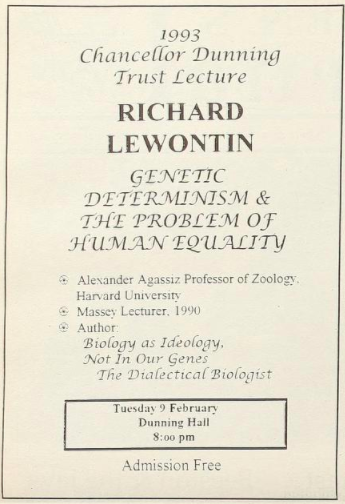
Richard Lewontin is Emeritus Professor of Biology and Emeritus Alexander Agassiz Professor of Zoology in the Museum of Comparative Zoology in the Department of Organismic and Evolutionary Biology at Harvard University. As an evolutionary geneticist, Prof. Lewontin helped to establish the field of molecular population genetics by merging molecular biology and evolutionary theory. He was also known for his research on the philosophical and social implications of genetics and evolutionary theory. Among his many books are The Genetic Basis of Evolutionary Change (1974), Human Diversity (1982), Biology as Ideology: The Doctrine of DNA (1991), and The Triple Helix: Gene Organism and Environment (1998). In 1972, Lewontin identified that most of the genetic variation within human populations is found within local geographic groups and differences attributable to racial groups are only a minor part of human genetic variability. He is a critic of neo-Darwinian approaches to evolutionary biology. He has also written about the development of agribusiness and the economics of genetic modification, suggesting that hybrid corn was developed not because it was a superior species of corn, but because it enabled corporations to force farmers to buy new seed each year. He has received numerous awards including a Fulbright Fellowship, the Sewall Wright Award from the American Society of Naturalists, and the Thomas Hunt Morgan Medal from the Genetics Society of America.
In his lecture, Lewontin discussed the problem of equality, which he called the “social agony” of the United States and Canada. To understand equality, he argued, one needed to study the history of social change over the past several centuries. He focused especially on the shift from a feudal society with little physical or class mobility to the modern capitalist nation-state. Society’s changing needs had helped to spur a new economy in which workers required the freedom of movement. This, in turn, required a revolution in the organization of society. However, these post-revolutionary societies were not based on equalities, and the solution to inequality of wealth and power had plagued thinkers and politicians since the 1700s. Lewontin discussed the mistaken belief that inequalities were entirely internal, based on one’s genetics, suggesting instead that they were also structural and environmental. He advised his audience to remain wary of genetic determinism and those who put too much stock in others’ genetic makeup, since much was still unknown.
Former Dunning Trust lecturer, Stephen J. Gould, addressed similar topics in his talk.